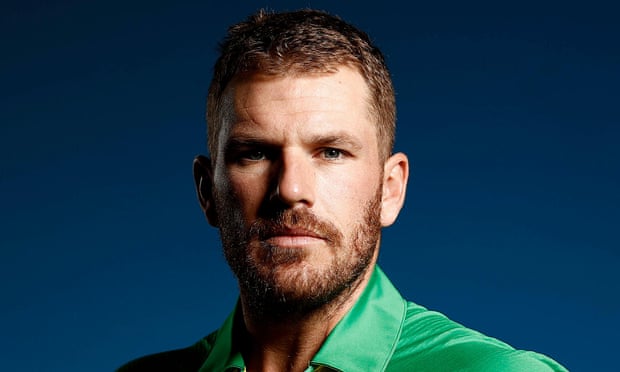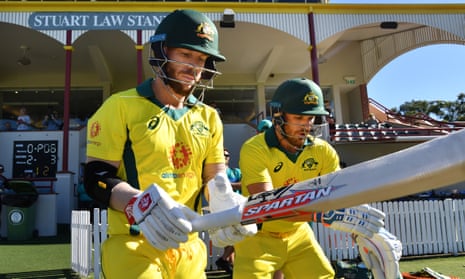A few months ago, we were talking up the prospect of Afghanistan spinning out Australia on 1 June. But at the last minute the five-times world champions clicked into the kind of gear their lineage demands.
Until early March, a couple of barren years had seen Australia win just four matches of 26. England inflicted nine of those defeats. But in Australia’s last eight ODIs a new-look side touring against India and Pakistan won the lot, while every player contributed.
Having replaced Darren Lehmann after 2018’s sandpaper fiasco, coach Justin Langer is familiar with the challenge of reviving a dispirited set-up. With the tonic of a few wins, his dressing room currently reflects a brighter mood. What he doesn’t have is a proven team. Some lack experience, while the combination of old and new remains unsettled.
Lehmann departed alongside his captaincy duo Steve Smith and David Warner. The latter pair now return after a year’s suspension. They’re tasked with recovering their best on the biggest stage in the game, while enduring a tougher welcome than they would at home.
Then there’s their effect on a team that was humming. Peter Handscomb and Ashton Turner were the first casualties, bumped from the World Cup squad despite going beautifully. Within the XI, Usman Khawaja has recently found his one-day groove, with innings of 104, 100, 98, 91 and 88 among his team’s eight wins. The catch is that he’s been opening the batting, in a prolific partnership with Aaron Finch.
Quick GuideAustralia: Cricket World Cup 2019
Show

Australia
ICC world ranking 5 (as of 6 May)
Captain Aaron Finch, left
Coach Justin Langer
World Cup best Winners 1987, 1999, 2003, 2007, 2015
Fixtures (10.30am unless stated)
1 June v Afghanistan, Bristol (1.30pm)
6 June v West Indies, Trent Bridge
9 June v India, The Oval
12 June v Pakistan, Taunton
15 June v Sri Lanka, The Oval
20 June v Bangladesh, Trent Bridge
25 June v England, Lord’s
29 June v New Zealand, Lord’s
6 July v South Africa, Old Trafford
Warner also has a fine record with Finch, and is a career opener with 14 one-day hundreds. Who takes the spot? Khawaja has a paltry record at No 3, and his sedate early pace warrants the longest time in the middle. If he drops a spot, Smith at No 4 will squeeze out Shaun Marsh, another player with a string of recent hundreds. Australia’s strokemakers also lack the six-hitting of teams like England and West Indies, to turn big scores into huge ones. All-rounder Marcus Stoinis has struggled for rhythm with the bat for some time, while wicketkeeper Alex Carey caresses more than bludgeons.
Attention will be on Mitchell Starc, the star of the 2015 tournament. He blasted out 22 wickets at 10 runs apiece with swing and pace, at better than a wicket every three overs. But injuries have seen his progress stutter, and he’s played only three ODIs in the last 16 months. Starc can win games on his own. Or if he’s astray, at his pace, he can lose them.
Starc’s key ally will be Pat Cummins. The formerly fragile quick is in the form of his life, having just won the Allan Border Medal for Australia’s best player of the last year. He’s bowled with intelligence and ferocity on all surfaces, and can find plenty to interest him in England. With the spin smarts of Nathan Lyon and Adam Zampa to back them up, Australia’s attack could run the show.
What’s their gameplan?
Wickets, and in a hurry. Losing Jhye Richardson to injury hurts, with his fast swing both ways. Starc and Cummins are the battering rams, with Jason Behrendorff and Nathan Coulter-Nile looking for English hoop, while on dry pitches Lyon and Zampa control the middle.
There haven’t been many huge Australian scores lately. They chased 359 against India in March, but main contributors Handscomb and Turner were dumped. With bowling as their stronger suit, Australia’s best chance is to chase or defend the middle range. The batsmen have to give them that chance.
Who’s their key player?
No question: Glenn Maxwell. In a line-up short on firepower, he’s the powder keg. His strike rate at the previous World Cup was 182, blasting his first international century among a series of devastating innings. Since then he’s added Test and T20 centuries for Australia but never got the chance to settle under Smith’s captaincy.
Under Langer and Finch, Maxwell has found his role in the middle format, and responded with a string of substantial innings that alternate responsibility and damage as required. He’s one of those rare talents who can hit balls to places that others can’t, and has shots that others never will. If this is his time, don’t miss a ball.
What is the realistic aim for Australia and why?
There are so many variables. Smith, Warner and Starc at their best are almost enough to win a trophy. But the likelihood of their best isn’t high. What Australia does have of late is consistency of effort and of returns across each other spot in the team. They may not have endless destructive potential like England or current individual brilliance like India, but they’re good enough to challenge any team. Get it right twice, and a sixth trophy is a distinct possibility.
Geoff Lemon is a Guardian writer, broadcaster and author of Steve Smith’s Men: Australian Cricket’s Greatest Downfall



Comments (…)
Sign in or create your Guardian account to join the discussion